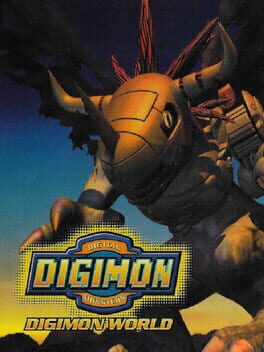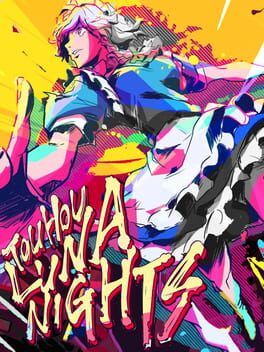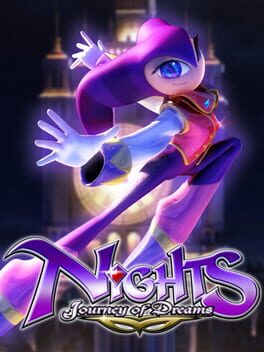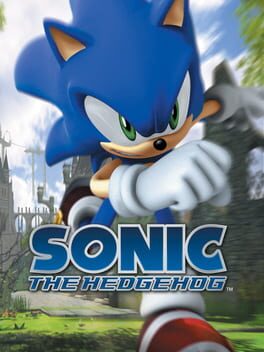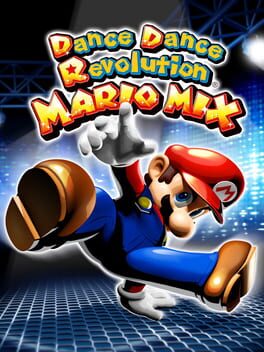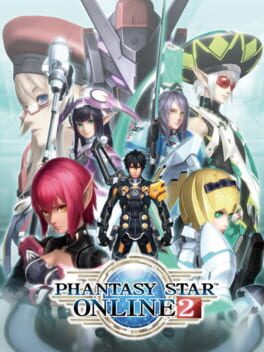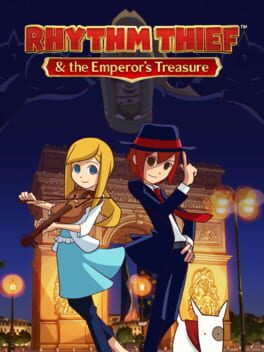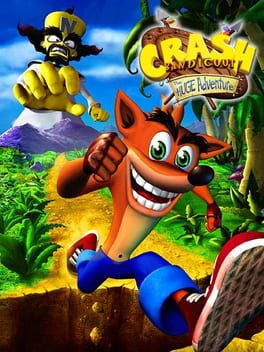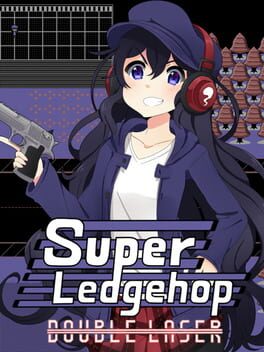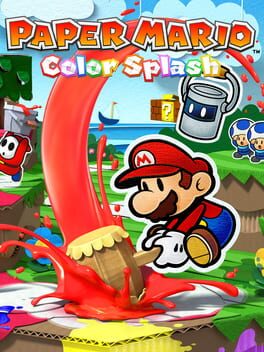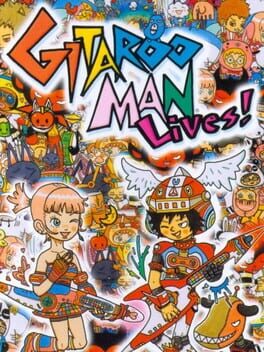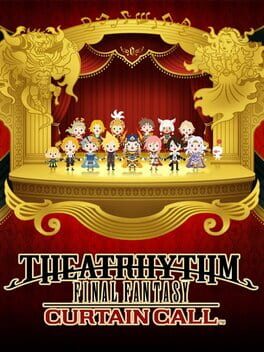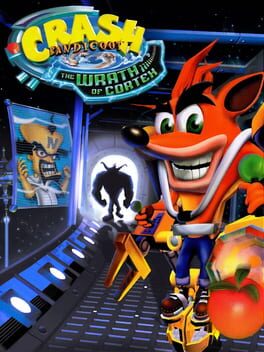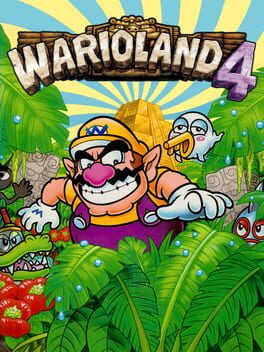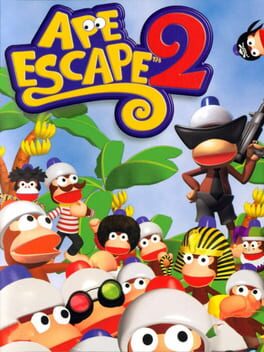Emm
1999
Digimon World is fascinating because it fills a niche that most other JRPGs wouldn't attempt and still won't: A very short, non-linear experience with meaningful exploration, no random encounters and almost no dungeons, sidequests that put you in unique scenarios and actually give valuable rewards, and a low-key soundtrack with many songs being made up of only ambient sounds. And when I say short, I mean "it took me 13 hours to finish my first playthrough" short (albeit while using a guide, but there's no way you'll be wanting to play it without one for reasons I'll elaborate on later anyway).
While other games may have incorporated elements of these ideas, Digimon World is unique because of the way it combines all these concepts together and then throws a pet-raising simulator on top of it. While anything related to raising stats or battles is very rough around the edges (combat involves almost no interaction, evolving your Digimon is extremely messy without a guide which I'll talk about in a moment, and many of its systems are incredibly unintuitive just in general), the rest of the game is so refreshing and almost genuinely subversive that it still shines through as a distinct experience that I wish more RPGs would take from.
It's a shame that parts of it are so unapprochable. When it comes to the actual Digimon raising process your playthrough will be greatly streamlined and mercifully sped up if you use a guide, because the alternative will be trying to manipulate numbers you don't understand and figure out what vauge parameters mean with NPCs barely illuminating anything. That last bit is the worst part--it'll be common for characters to tell you that these systems exist but not give you any way of finding out which stats you need to evolve into which Digimon, and sometimes they don't even let you track some of these parameters in-game at all.
If the game's other ideas sound interesting to you and you're willing to push past that clunkiness then it's worth trying out--again, just make sure to use a guide. And if the frequently memed Digivolution mechanics still seem too intimidating, they do give you an Ultimate Digimon for free later on which will let you finish practically any main story fight without having to stress out over raising your Digimon in a specific way.
While other games may have incorporated elements of these ideas, Digimon World is unique because of the way it combines all these concepts together and then throws a pet-raising simulator on top of it. While anything related to raising stats or battles is very rough around the edges (combat involves almost no interaction, evolving your Digimon is extremely messy without a guide which I'll talk about in a moment, and many of its systems are incredibly unintuitive just in general), the rest of the game is so refreshing and almost genuinely subversive that it still shines through as a distinct experience that I wish more RPGs would take from.
It's a shame that parts of it are so unapprochable. When it comes to the actual Digimon raising process your playthrough will be greatly streamlined and mercifully sped up if you use a guide, because the alternative will be trying to manipulate numbers you don't understand and figure out what vauge parameters mean with NPCs barely illuminating anything. That last bit is the worst part--it'll be common for characters to tell you that these systems exist but not give you any way of finding out which stats you need to evolve into which Digimon, and sometimes they don't even let you track some of these parameters in-game at all.
If the game's other ideas sound interesting to you and you're willing to push past that clunkiness then it's worth trying out--again, just make sure to use a guide. And if the frequently memed Digivolution mechanics still seem too intimidating, they do give you an Ultimate Digimon for free later on which will let you finish practically any main story fight without having to stress out over raising your Digimon in a specific way.
2019
Mechanically excellent but would've vastly benefitted from being a traditional platformer rather than a Metroidvania. Areas never connect to each other in any interesting or meaningful ways and half the upgrades are literal keys to locked doors (this happens five times and that's not even counting the upgrades that aren't keys but may as well be like the screw knives and the ice magatama), greatly diluting the exploration--the hidden upgrades help, but they only do so much.
The time stopping is fantastic and the game's existence is worth it for that alone, it's an idea that never gets old and the way it interacts with all the other systems is genius. It's put to many creative uses, but this is further reasoning for why I don't think the Metroidvania structure benefits it much. If the level design had been more focused I think even more mileage could've been squeezed out of this system since it could've justified more complex challenges in every room as you wouldn't be needing to backtrack through them multiple times. Both Guacamelee titles come to mind as games that are kind of open but regularly funnel you through linear gauntlets of platforming challenges that push your moveset to its absolute limit in an incredibly satisfying way that I think could've worked great for Luna Nights too.
In its current state it's difficult for me to not feel that Luna Nights has some major missed potential, but that shouldn't take away from the fact that the rest of it is still solid and contains a lot of clever systems that connect to each other in engaging ways. It's worth a playthrough, but it makes me sad thinking about what it could've been and how close Team Ladybug was to creating a masterpiece.
also the extra stage kind of sucks
The time stopping is fantastic and the game's existence is worth it for that alone, it's an idea that never gets old and the way it interacts with all the other systems is genius. It's put to many creative uses, but this is further reasoning for why I don't think the Metroidvania structure benefits it much. If the level design had been more focused I think even more mileage could've been squeezed out of this system since it could've justified more complex challenges in every room as you wouldn't be needing to backtrack through them multiple times. Both Guacamelee titles come to mind as games that are kind of open but regularly funnel you through linear gauntlets of platforming challenges that push your moveset to its absolute limit in an incredibly satisfying way that I think could've worked great for Luna Nights too.
In its current state it's difficult for me to not feel that Luna Nights has some major missed potential, but that shouldn't take away from the fact that the rest of it is still solid and contains a lot of clever systems that connect to each other in engaging ways. It's worth a playthrough, but it makes me sad thinking about what it could've been and how close Team Ladybug was to creating a masterpiece.
also the extra stage kind of sucks
This game is almost fascinating with how completely antithetical and misguided it is compared to what came before it.
Into Dreams was a focused, very tight 7 mission experience that didn't overstay its welcome, whereas Journey of Dreams bombards you with insane amounts of cutscenes (it takes nearly 15 minutes to get to the first level!), pads the structure to hell and back, and regularly makes incredibly strange diversions from the main gameplay. This time there's 31 missions and only a small number of them actually feel meaningful; the rest are spent on throwaway gimmick sections, godawful 3D "platforming", and completely out-of-place vehicle stages.
And you want to know the craziest part? It's a 5 hour game! There's this much padding in a five hour game! If Journey of Dreams just stuck with only having one mission per world and cut the rest of the dumb bullshit (which would make it a 7 mission package again) then maybe I'd be willing to say that it's an underwhelming successor but still okay for what it is. At its best it doesn't add much interesting to the NiGHTS formula--the transformations are a great idea squandered by being used so uncreatively--but it'd still be passable. But when the experience is filled with so much bloat and uneven pacing it's hard for me to recommend it even to fans of the series.
Into Dreams was a focused, very tight 7 mission experience that didn't overstay its welcome, whereas Journey of Dreams bombards you with insane amounts of cutscenes (it takes nearly 15 minutes to get to the first level!), pads the structure to hell and back, and regularly makes incredibly strange diversions from the main gameplay. This time there's 31 missions and only a small number of them actually feel meaningful; the rest are spent on throwaway gimmick sections, godawful 3D "platforming", and completely out-of-place vehicle stages.
And you want to know the craziest part? It's a 5 hour game! There's this much padding in a five hour game! If Journey of Dreams just stuck with only having one mission per world and cut the rest of the dumb bullshit (which would make it a 7 mission package again) then maybe I'd be willing to say that it's an underwhelming successor but still okay for what it is. At its best it doesn't add much interesting to the NiGHTS formula--the transformations are a great idea squandered by being used so uncreatively--but it'd still be passable. But when the experience is filled with so much bloat and uneven pacing it's hard for me to recommend it even to fans of the series.
2006
giving this five stars is pretty generous given the amount of dumb shit this game has (lots of 2012 MMO jank, the UI is confusing, the tutorialization tells you both too much and too little at the same time, the first half of the story mode is fucking incomprehensible, the NA translation is blatantly unfinished, and so on) but the fact that i'm still giving it five stars despite all this bullshit should be a display of just how high this game's strengths reach.
despite how archaic a lot of pso2's systems are, there's a lot of surprisingly smart design that may seem odd at first but ends up working in its favor. the main story being completely skippable lets you get to the raids immediately, leveling up is lightning fast compared to most other MMOs, the difficulty system allows even tutorial dungeons to have max level variants, the lack of the tank + healer + DPS trinity means that all the classes can be built wildly different from each other (one turns the game into a third-person shooter, one is a pet raising sim--the variety is nuts even if a few classes overlap a bit), there's so many ideas that shouldn't work by conventional standards but they end up making the game unique and allow it dodge a lot of problems it could've run into otherwise.
the combat is excellent. the weapons offer a great amount of variety and interesting systems to play around with, and the animation work is stellar and conveys impact extremely well. there's just so many cool systems to master; not every class is a home run, but most of them manage to be a blast even on just a fundamental level, especially the unlockable successor classes. the bosses are even better--phaleg and omega masquarade are some of the most fun i've had fighting a boss in any action game.
pso2 can be a bit difficult to get into with how obtuse it is but it's well worth taking the plunge if you can get past the fact that it is still ultimately an MMO at its core. it's just a really damn good one.
EDIT: nevermind don't take the plunge i take it back. base pso2 is still "supported" after NGS but that's supported in name only. there are still base players but there's so few that aren't playing NGS now that i have no idea how someone even would get into base PSO2 and make solid progress at this point with the lack of promotional campaigns + significantly less boosters and also the dumpster fire-tier economy. shame!
despite how archaic a lot of pso2's systems are, there's a lot of surprisingly smart design that may seem odd at first but ends up working in its favor. the main story being completely skippable lets you get to the raids immediately, leveling up is lightning fast compared to most other MMOs, the difficulty system allows even tutorial dungeons to have max level variants, the lack of the tank + healer + DPS trinity means that all the classes can be built wildly different from each other (one turns the game into a third-person shooter, one is a pet raising sim--the variety is nuts even if a few classes overlap a bit), there's so many ideas that shouldn't work by conventional standards but they end up making the game unique and allow it dodge a lot of problems it could've run into otherwise.
the combat is excellent. the weapons offer a great amount of variety and interesting systems to play around with, and the animation work is stellar and conveys impact extremely well. there's just so many cool systems to master; not every class is a home run, but most of them manage to be a blast even on just a fundamental level, especially the unlockable successor classes. the bosses are even better--phaleg and omega masquarade are some of the most fun i've had fighting a boss in any action game.
pso2 can be a bit difficult to get into with how obtuse it is but it's well worth taking the plunge if you can get past the fact that it is still ultimately an MMO at its core. it's just a really damn good one.
EDIT: nevermind don't take the plunge i take it back. base pso2 is still "supported" after NGS but that's supported in name only. there are still base players but there's so few that aren't playing NGS now that i have no idea how someone even would get into base PSO2 and make solid progress at this point with the lack of promotional campaigns + significantly less boosters and also the dumpster fire-tier economy. shame!
Prime example of a game that's more than the sum of its parts. The mechanics are fine but lots of mini-games are repeated and the motion control segments have no fucking place in a rhythm game, the story is charming and goes in a cool direction but it's not that exciting, and the soundtrack is fine for what it is but it's not necessarily a standout by rhythm game standards (and this genre is justifiably held to high standards when it comes to music).
Despite this, all of its pieces come together to form something that's actually pretty special. There's really no other rhythm game like Rhythm Thief: none that has the variety of its levels (even with the repeats), the ambition of its plot, and its exploration mechanics and sidequests all in one package. There are titles that have some of these elements, but none that try and combine all of them the way Rhythm Thief does, and it's this fusion that elevates it to being something that's noteworthy despite all its flaws. If you were ever curious about this title, it's worth a playthrough--it may not stick with you, but it's a lot of fun while it lasts. (Most of the time.)
Despite this, all of its pieces come together to form something that's actually pretty special. There's really no other rhythm game like Rhythm Thief: none that has the variety of its levels (even with the repeats), the ambition of its plot, and its exploration mechanics and sidequests all in one package. There are titles that have some of these elements, but none that try and combine all of them the way Rhythm Thief does, and it's this fusion that elevates it to being something that's noteworthy despite all its flaws. If you were ever curious about this title, it's worth a playthrough--it may not stick with you, but it's a lot of fun while it lasts. (Most of the time.)
giving this one an extra half star just because it's the first game i've played that has a colorblind protagonist
(the mechanics are also actually pretty fun. "bullet hell with rhythm game mechanics" seems like such a natural combination that playing it made me question why the idea hadn't already been done sooner. don't let the trailer turn you off--this is a case where it's much better than it seems at first glance, and while the writing and story is very shitposty it's still enjoyable for what it is and does have some genuinely funny moments)
(the mechanics are also actually pretty fun. "bullet hell with rhythm game mechanics" seems like such a natural combination that playing it made me question why the idea hadn't already been done sooner. don't let the trailer turn you off--this is a case where it's much better than it seems at first glance, and while the writing and story is very shitposty it's still enjoyable for what it is and does have some genuinely funny moments)
I've seen this sold as "sure it may be a bad RPG but it's still a fun adventure game!" but the reality is that it's a bad adventure game too. The exploration is slow, tedious, and goes out of its way to be as obnoxious as possible (especially with how you get kicked out of levels every time you pick up one of the main collectibles, and since a lot of levels have multiple of these collectibles you have to replay old stages constantly). There's also more forced encounters compared to Sticker Star so now you have to deal with the boring battle system whether you like it or not.
It does have some nice environments later on though.
It does have some nice environments later on though.
2006
Substantially worse version of a masterpiece. The 30 FPS feels awful, it looks uglier across the board, and the difficulty got a giant nerf (especially on Master Mode) which is an incredibly misguided decision given that the challenge of Master Mode is what made it so satisfying in the first place. This port also misses the opportunity to fix one of the few flaws in the original game, which is the extremely long unskippable intros on some stages.
Some of these changes were presumably inevitable given the hardware and I imagine the easier patterns and more lenient timing were to compensate for the smaller screen size but it's still just a much worse version overall. The new multiplayer stages are nice but they're not worth compromising everything else.
Some of these changes were presumably inevitable given the hardware and I imagine the easier patterns and more lenient timing were to compensate for the smaller screen size but it's still just a much worse version overall. The new multiplayer stages are nice but they're not worth compromising everything else.
It's alright. The RPG mechanics are superfluous and half the songs don't feel like they make for a good rhythm game at all (especially any of the Field stages which are way too easy compared to the Battle tracks), but the scope and quantity of tracks available is genuinely impressive and it's still pretty fun.
Even if it got the time and money needed to properly polish it, I still don't think I would've liked it. There's maybe five or six levels that are full, uninterrupted Crash Bandicoot levels that don't shoehorn in some godawful vehicle segment or make you play as a character with less abilities. The game is constantly going out of its way to present a new horrendous gimmick section that long overstays its welcome and is a pain in the ass to control, especially with there being THREE fucking submarine levels.
Even the traditional levels (when there actually are any) aren't that great. Most of Crash's animations feel like they're 20% slower than supposed to be, especially with how floaty the jumping is. The stages are also way too wide, allowing you to just casually walk past most of the enemies. Climbing across ceilings is also comically slower.
The lack of unique upgrades is disappointing as well. In an ideal world it could've been a Banjo Tooie situation where you start off with all the Crash 3 moves and unlock new abilities on top of that, but that's not the case. Aside from the sneaking shoes you just re-unlock all the Crash 3 abilities again because ???????
Very disappointing game from several angles.
Even the traditional levels (when there actually are any) aren't that great. Most of Crash's animations feel like they're 20% slower than supposed to be, especially with how floaty the jumping is. The stages are also way too wide, allowing you to just casually walk past most of the enemies. Climbing across ceilings is also comically slower.
The lack of unique upgrades is disappointing as well. In an ideal world it could've been a Banjo Tooie situation where you start off with all the Crash 3 moves and unlock new abilities on top of that, but that's not the case. Aside from the sneaking shoes you just re-unlock all the Crash 3 abilities again because ???????
Very disappointing game from several angles.
2001
Wario Land 4 is sort of an enigma in the way that it's constantly being pulled in so many different directions, yet they all somehow connect together flawlessly. It's incredibly refined yet also very experimental both structurally and mechanically, it's charming and sometimes legitimately funny but also knows how to pull together an engrossing atmosphere when it wants to, it just feels like such an outlier from everything else out there.
There's nothing else quite like Wario Land 4, and the way that all its distinguishing ideas come together in such an organic and natural way despite the ridiculous amount of ambition really makes it something special.
(okay yeah i'm willing to admit the mini-games kind of suck but they're completely optional ok)
There's nothing else quite like Wario Land 4, and the way that all its distinguishing ideas come together in such an organic and natural way despite the ridiculous amount of ambition really makes it something special.
(okay yeah i'm willing to admit the mini-games kind of suck but they're completely optional ok)
2002
